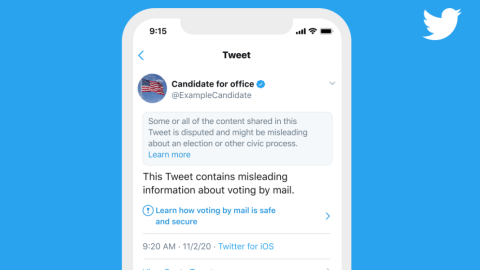Election results: How Twitter, Facebook plan to block misinformation

Credit: Twitter
- Twitter says it will remove or add a warning to tweets that declare election wins before official results are declared, as determined by national media outlets.
- When Twitter users try to retweet, the company will show them a prompt encouraging them to “quote tweet” (and thereby add their own commentary) instead, a move designed to slow the spread of misinformation.
- Facebook plans to display election results, as determined by national media outlets, on posts from candidates who contest the results or declare early wins.
As the results of the U.S. presidential election start rolling in Tuesday evening, Facebook and Twitter plan to remove or modify posts they deem misleading.
Twitter first announced the plans in October, but elaborated on them Monday in a blog post.
The company says it will remove or add a warning to tweets that declare election wins before they’re “authoritatively called” by a state election official, or by at least two of the following national media outlets: ABC News, The Associated Press, CBS News, CNN, Decision Desk HQ, Fox News, and NBC News.
“We do not allow anyone to use Twitter to manipulate or interfere in elections or other civic processes, and recently expanded our civic integrity policy to address how we’ll handle misleading information surrounding these events. Under this policy, we will label Tweets that falsely claim a win for any candidate and will remove Tweets that encourage violence or call for people to interfere with election results or the smooth operation of polling places.”
Twitter also plans to remove or modify tweets “meant to incite interference with the election process or with the implementation of election results, such as through violent action, will be subject to removal.”
Twittertwitter.com
Expect to see Twitter attach warnings — which users must tap through — on “misleading” tweets from candidates, campaign accounts, and accounts with more than 100,000 followers.
Twitter is also trying to make it harder for the average user to retweet misleading tweets by prompting them to “quote tweet” when they click the retweet button. The goal is to add a layer of “friction” that slows the spread of posts deemed misleading.
Twittertwitter.com
“We hope it will encourage everyone to not only consider why they are amplifying a Tweet, but also increase the likelihood that people add their own thoughts, reactions and perspectives to the conversation.”
Another change: Twitter will prevent “liked by” and “followed by” recommendations from appearing in users’ timelines. The company notes that, while this feature can help people access viewpoints outside their network, it doesn’t “believe the ‘Like’ button provides sufficient, thoughtful consideration prior to amplifying Tweets to people who don’t follow the author of the Tweet, or the relevant topic that the Tweet is about.”
Twittertwitter.com
“This will likely slow down how quickly Tweets from accounts and topics you don’t follow can reach you, which we believe is a worthwhile sacrifice to encourage more thoughtful and explicit amplification.”
Twitter’s policy changes are the latest in a series that aim to minimize the influence of misinformation on U.S. elections. Of course, Twitter’s policies are also likely designed to shield the company from accusations that it’s eroding the quality of American political discourse.
Twitter listed some of its recent policy changes, the most impactful of which was its decision to ban political ads in late 2019:
- 1/2019 – Issued a comprehensive review of our efforts to protect the 2018 U.S. midterms
- 6/2019 – Launched public interest notice and defined our approach on public interest
- 10/2019 – Banned all political ads on Twitter, including ads from state-controlled media
- 12/2019 – Added Election Labels to candidates’ accounts
- 2/2020 – Introduced our rules on and labels for synthetic and manipulated media
- 3/2020 – Held planning exercises to prepare for a variety of Election Day scenarios
- 5/2020 – Added labels and warnings to potentially harmful misleading information
- 8/2020 – Deployed labels on government and state-affiliated media accounts
- 9/2020 – Implemented account security requirements for high-profile political accounts
- 9/2020 – Built a U.S. Election hub containing credible news and voting resources
- 9/2020 – Encouraged voter registration and emphasizing safe voting options
- 9/2020 – Expanded our civic integrity policy to include specifics around pre and post election day
Similar to Twitter, Facebook wrote in a blog post that it will label potentially misleading posts with election results, as determined by national media outlets.
“If a candidate or party declares premature victory before a race is called by major media outlets, we will add more specific information in the notifications that counting is still in progress and no winner has been determined.”
“If the candidate that is declared the winner by major media outlets is contested by another candidate or party, we will show the name of the declared winning candidate with notifications at the top of Facebook and Instagram, as well as label posts from presidential candidates, with the declared winner’s name and a link to the Voting Information Center.”

Credit: Facebook
Instagram, which is owned by Facebook, plans to temporarily hide hashtags on all “recent” posts, the company wrote on its website:
“Recent posts from all hashtags may be temporarily hidden to help prevent the spread of possible false information and harmful content related to the 2020 US election. Instagram is committed to reducing the spread of false information and giving people accurate information about voting.”
After the election, Facebook and Instagram plan to stop circulating all political ads in an effort to block misinformation about the outcome. The company said this ban should last a week.





